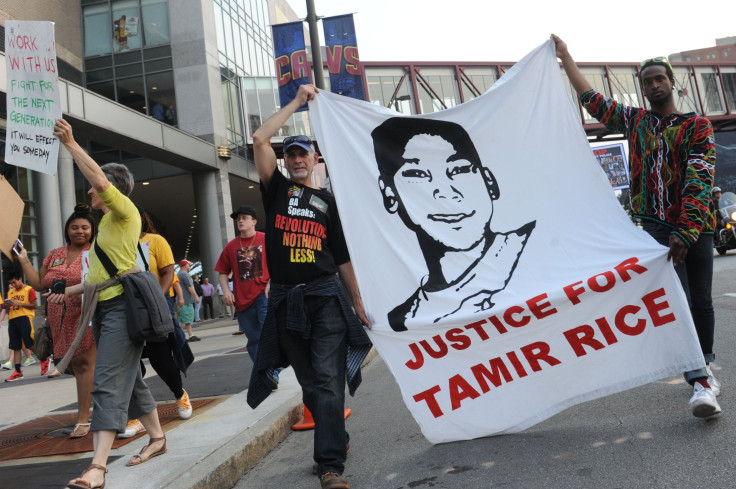Cleveland Shooting Of 12-Year-Old Boy Tamir Rice Remembered One Year Later: What To Know About The Case

Sunday marked one year since Tamir Rice, a 12-year-old black boy playing with a toy pistol in a snow-covered park in Cleveland, was gunned down by a white rookie police officer. Although Rice's death happened amid a year of nationwide protests against police homicides in communities of color, the boy’s death is one of a few national cases that has languished without resolution or closure.
Family members and supporters announced plans to mark the anniversary of the boy’s death Sunday with a demonstration in Cleveland organized by the Stop Mass Incarceration Network, a national social justice group. A separate group planned to hand deliver hundreds of thousands of petitions to the Cuyahoga County Prosecutors Office Monday, as part of a demand for a special prosecutor's review of possible charges against Timothy Loehmann, the Cleveland police officer who shot the boy Nov. 22, 2014.
Rice's death has been reviewed numerous times since Loehmann shot him within seconds of advancing on the boy in a park outside a local community recreational center. The officer and his partner, Frank Garmback, drove their police cruiser within several feet of Rice, who had been described to them as an adult male waving a firearm; however, the person who called 911 also said the firearm was "probably fake." Activists and the boy’s family have questioned why the officers did not exercise more restraint to determine Rice's age and whether the object he was carrying was an imitation handgun.
It's been almost a year without #TamirRice - Year Without #Justice pic.twitter.com/8VOYTp6ajj
— 1-800-WOKE-AF (@gloed_up) November 20, 2015Following months of protests led by activists in several racial justice movements, including the Black Lives Matter Network, Cuyahoga County Prosecutor Tim McGinty commissioned reviews of Tamir’s death. One review by the country sheriff’s department included a re-staging of the scene at the park. Two independent law enforcement experts also investigated the shooting.
Meanwhile, a state court judge indicated in June there was probable cause to file charges against Loehmann, who had not cooperated in the investigation, asserting his right not to with support from a police union. McGinty, who was expected to present the results of his investigation to a grand jury, said a determination on charges against Loehman could come soon.
The manner of the investigation and release of reports in the independent review cast doubt among Rice's family and their supporters that Loehman ever will face a court. Kimberly Crawford, a retired federal law enforcement agent, and S. Lamar Sims, a prosecutor from Colorado, said in reports released in October Loehmann was justified in shooting Tamir because of a U.S. Constitution-supported “split-second” fear for his safety and the safety of others, including his partner.
It was reasonable for a CPD officer to shoot #TamirRice after he reached for this realistic pistol at his waist. pic.twitter.com/RdMMG89dTX
— Bob Owens (@bob_owens) October 11, 2015The release of those reports turned many members of the public against McGinty, with some calling for a special prosecutor to take over the case. Petitioners contend McGinty, an elected official, has not been impartial to police officers, an allegation his office has repeatedly denied.
Rashad Robinson, director of the racial justice group ColorOfChange, accused McGinty of mishandling the case. “Instead of the timely justice Tamir’s family deserves, McGinty has taken an entire year to investigate this tragedy,” Robinson said in a statement released Friday. “It’s long past time McGinty acknowledged his lost credibility and requested a special prosecutor. We will not rest, until he is off this case.”
Samaria Rice, Tamir’s mother, has been outspoken about her son’s death, traveling the country for most of the last year seeking structural changes to the nation’s criminal justice system and law enforcement policies. Along with the racial profiling that contributed to Tamir's death, police have been emboldened to use lethal force by the immunity that most enjoy in line-of-duty homicides, Samaria Rice said during a panel discussion of experts on racism at the United Nations in New York City earlier this month. "I want the world to know that letting a child go outside to play never to come home is a parent’s worst nightmare," she said.
© Copyright IBTimes 2025. All rights reserved.






















